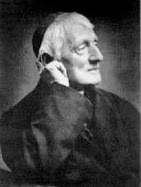The First Letter of St. Paul to the Corinthians 1:21
 St. Paul, the Apostle to the Gentiles, has been a presence in my own life from the start. I was brought up in an Episcopal parish that bears his name, so he has always been an intriguing figure to me. Last September, my husband and I had the privilege of visiting the Basilica of St. Paul Outside the Walls during the Anglican Use Society pilgrimage to Rome. The picture to the left is of his sculpture in front of the basilica. Following the usual practice, he is depicted with the instrument of his martyrdom, a sword. I have included below several photos of the interior taken by my husband.
St. Paul, the Apostle to the Gentiles, has been a presence in my own life from the start. I was brought up in an Episcopal parish that bears his name, so he has always been an intriguing figure to me. Last September, my husband and I had the privilege of visiting the Basilica of St. Paul Outside the Walls during the Anglican Use Society pilgrimage to Rome. The picture to the left is of his sculpture in front of the basilica. Following the usual practice, he is depicted with the instrument of his martyrdom, a sword. I have included below several photos of the interior taken by my husband.The very name of this blog owes a debt to St. Paul. As I said in my Welcome entry, the"folly" I mean is the sort described by St. Paul. He preached the gospel of Christ knowing full well that he would be denounced as a fool by many of those who heard him. He perservered because he knew that "the foolishness of God is wiser than men, and the weakness of God is stronger than men." What a great saint he was, and how far I fall short of his example most of the time.
To get to the point of this post--tomorrow is the Feast of St. Peter and St. Paul. Not to slight St. Peter, the first Vicar of Christ and one of the Church's greatest saints. But this day also commences the Year of St. Paul, as declared by Pope Benedict XVI on the same date last year. (See the full story on Zenit.) Why 2008? Because it is thought by the Church to be the 2000th year since the birth of St. Paul.
The following excerpt from the Vatican's statement describes the "ecumenical dimension" intended by the Holy Father, something very near and dear to my convert heart:
'The Apostle of the Gentiles, who dedicated himself to the spreading of the good news to all peoples, spent himself for the unity and harmony of all Christians,' the Pope said.I would appreciate hearing from those of you who have been, in the Pope's words, "inspired by [Paul] and his teaching," either through association with an institution bearing his name or in some other way. Comments are welcome.
'May he guide us and protect us in this bimillenary celebration,' he added, 'helping us to advance in the humble and sincere search for the full unity of all the members of the mystical body of Christ.'









No comments:
Post a Comment